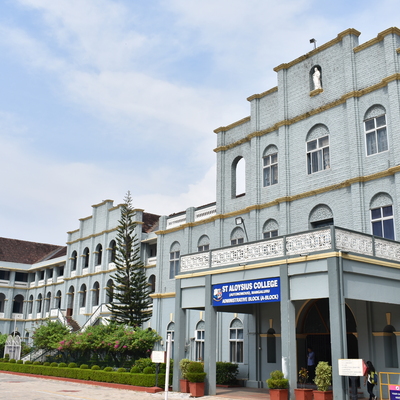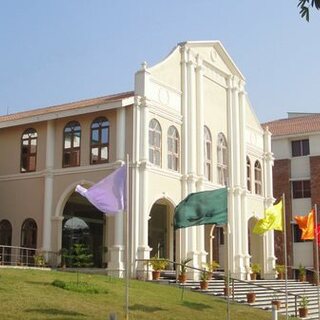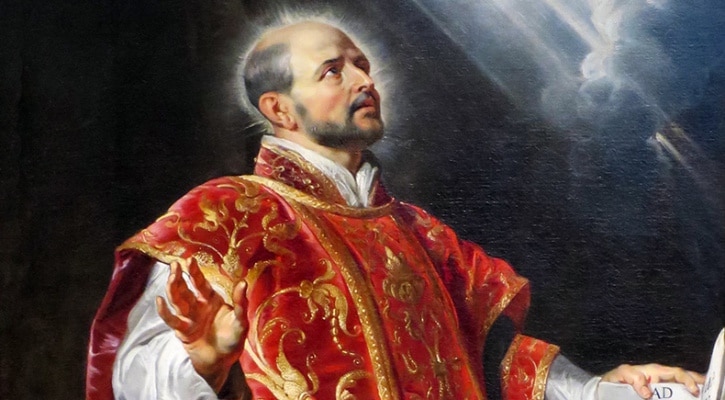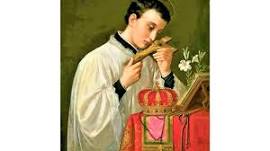

At University SAC, we believe in the transformative power of education and the boundless potential within every individual. Established in 1971, we have been dedicated to fostering intellectual curiosity, academic excellence, and a vibrant campus community.
undergraduate & graduate students
SAC University Faculty & Staff
SAC University alumni Worldwide
undergraduate & graduate students

Click here to view: SAC Organogram
St Aloysius College now deemed to be University belongs to a network of educational institutions administered by the members of the Society of Jesus, a religious order which runs schools, colleges and universities in more than 105 countries in the world. Established in 1880, St Aloysius College, now Deemed to be University prides itself in its history of 144 years. Despite its status as a minority institution, the college has imparted high-quality education to all sections of society regardless of caste, colour or creed. The motto of the university, “Lucet et Ardet” which means “Shine to Enkindle” has inspired countless students to become men and women for and with others and thus bring light and joy into the lives of people. It is for this reason that Jesuit education has become a touchstone for evolving new paradigms in higher education. In 1880, 9 Jesuits landed in Mangalore at the request made by Mangaloreans to establish an institution of quality higher education. The (then) College celebrated its Centenary celebrations in 1980 in a grand manner for which our former President of India, Sri Neelam Sanjeeva Reddy was the chief guest and witnessed the celebration. In the year 2002, the college campus witnessed the arrival of our beloved former President, Dr APJ Abdul Kalam for the inauguration of the Information Technology Block.
As the (then) College felt that it was ready for an assessment by external agencies like the NAAC, it subjected itself to the rigorous exercise of the first cycle of NAAC Accreditation in 2005. The institution received a high score of 86.7%. The institution has seen tremendous growth after it became autonomous in 2007. The College offers a variety of courses across disciplines both at the undergraduate and postgraduate levels.

This is the Crest and the Motto of this institution. Let this be always before your eyes to remind you the aims and objectives of your education and the level of excellence you are expected to achieve in this College.
If you have a closer look at it, on the right half of the shield like crest, you see three soaring eagles reminding you that you should never be satisfied with mediocrity, but aim at excellence in intellectual,physical and spiritual
dimensions of your personality. Besides, you also see a jumping lion symbolizing the vigour and courage you must cultivate.
On the left half of the Crest, you observe the sun shining over the West Coast.Every student passing through the portals of this institution must be like the sun illuminating and contributing to the growth and prosperity of the people of this land.
Comrades, raise a joyful chorus
Loud and glad your hearts outpour
While the love of Alma Mater
Bids our grateful song up-soars
While we pledge to stand united
True to her for evermore
Her's the glorious gifts we've treasured
Love of faith and learning store.
Sword and shield to strike and shelte
r
Till life's double fight is o'er.
Till from out the deadly combat
We come victors evermore.
Mother like for all her children
Help of Heaven she doth explore
Whether rest they 'neath her mantle
Or fare distant from her door.
Like a kindly spirit watching
Over them evermore.
High up on the hill of idgah,
Stands the home our hearts adore,
Proud above the pride of palm trees,
And the far sea's softened roar,
Hill and deep and palm abiding,
Our examples ever more.
Louder, louder swell the chorus
For the happy days of yore,
For the hopeful toiling present
And the years that lie before,
For the name and fame and honour
Of our mother evermore.
By the God whose greater glory
Governs still thy life and lore,
By the love thou give'st thy children
And the light that thou dost pour,
Prosper thou, dear Alma Mater,
Aye for ever, evermore.

About the Founder
St Ignatius of Loyola was born in the ancestral castle of the Loyolas in the Basque
province of Guipúzcoa, Spain, in 1491. The youngest son of a noble and wealthy
family, Ignatius became a page in the service of a relative, Juan Velázquez de
Cuéllar, treasurer of the kingdom of Castile in 1506. In 1517 Ignatius passed as a
knight into the service of another relative, Antonio Manrique de Lara, duke of Nájera
and viceroy of Navarre, who employed him in military undertakings and on a
diplomatic mission. While defending the citadel of Pamplona against the French, in
May 1521. Ignatius was hit by a cannonball, on sustaining a bad fracture of his right
leg and damage to his left. This event closed the first period of his life.
The period of reorientation is the second period of Ignatius’ life, in which he turned
toward a saintly life. After the treatment at Pamplona, he was shifted to Loyola in
June 1521. There his condition was serious and underwent painful surgeries. During
the period, he read the life of Christ and a book on the lives of the saints. The
version of the lives of the saints contained prologues to the various lives by a
Cistercian monk who conceived the service of God as a holy chivalry. This view of
the life profoundly moved and attracted Ignatius.
In February 1522, Ignatius bade farewell to his family and went to Montserrat, a
place of pilgrimage in the north-eastern Spain. He spent three days in confessing
the sins of his whole life, hung his sword and dagger near the statue of the Virgin
Mary as symbols of his abandoned ambitions and went to Manresa at Barcelona.
The sojourn at Manresa was marked by spiritual trials as well as joy and interior
light. There he sketched the fundamentals of his little book The Spiritual Exercises
which was approved by the then Pope Paul III in 1548. This book is a manual of
spiritual arms containing a vital ad dynamic system of spirituality. This is the end of
the second period of his life.
In March 1523, Ignatius left Barcelona and went for a pilgrimage to Jerusalem. He
wanted to settle in Jerusalem but the Franciscan custodians of the shrines of the
Latin Church did not listen to his plan. He left Jerusalem and reached Barcelona in
March 1524. There he studied Latin for nearly two years. In 1526, he was
transferred to Alcala. There he formed a little group as his followers. Due to this, he
was found to be suspicious and imprisoned along with his followers. When he was
found innocent and released, he left Alcala and reached Paris on February 2, 1528
and remained as a student until 1535. During his stay there, he won the coveted
M.A. of the famous university of Paris.
In 1537, Ignatius along with his companions wanted to make a pilgrimage to
Jerusalem but war between Venice and Turkish Empire rendered this impossible.
During this period, Ignatius had one of the decisive experiences of his life. At a
roadside Chapel of La Storta, he saw a vision of Christ with a cross on his shoulder
and beside him the Eternal Father, who said, “I wish you to take this man for your
servant” and Jesus took him and said, “My will is that you should serve us”. On
Christmas day of 1538, he said his first Mass at the Church of St Mary Major in
Rome. This is the end of the third period of his life.
Founding of the Jesuit Order – Society of Jesus:
The final period of Loyola’s life was spent in Rome or its vicinity. In 1539, the
companions decided to form a permanent union named ‘Society of Jesus’, adding a
vow of obedience to a superior elected by themselves to the vows of poverty,
chastity and obedience to the Roman pontiff that they had already taken. In 1540,
Pope Paul III approved the plan of the new order ‘Society of Jesus’ and Ignatius
Loyola was the choice of his companions for the office of General.
The Society of Jesus developed rapidly under Ignatius’ guidance. When he died
there were already about 1,000 Jesuits divided into 12 administrative units, called
provinces. Three of these were in Italy, a like number in Spain, two in Germany, one
in France, one in Portugal and two overseas in India and Brazil. Ignatius in his last
years was occupied with Germany and India, to which he sent his famous followers
Peter Canisius and Francis Xavier. He also dispatched missionaries to the Congo
and to Ethiopia. In 1546, Ignatius secretly received into the Society Francis Borgia,
duke of Gandía and viceroy of Catalonia. When knowledge of this became public
four years later it created a sensation. Borgia organized the Spanish provinces of
the order and became third general.
Ignatius Loyola left his mark on Rome. He founded the Roman College, embryo of
the Gregorian University, and the Germanicum, a seminary for German candidates
for the priesthood. He also established a home for fallen women and one for
converted Jews. He and his work were much admired during his lifetime. But he
also met with opposition in the church, outside it by the Protestant leaders and even
from some of the Catholics.
Due to frequent illness, Ignatius Loyola resigned from the post of Superior in
January 1551. But he continued to direct the Order until his death on July 31, 1556.
Cannonization:
Ignatius Loyola was beatified by Pope Paul V in 1609 and was canonized by Pope
Gregory XV in 1622 and his Feast Day is July 31. In 1922, he was declared Patron
of all Spiritual Retreats by Pope Pius XI. The spirit of Ignatius of Loyola lives on in
the Society of Jesus and in the Jesuit Constitutions, which still regulate the lives and
aspirations of over 14,000 Jesuits, scattered through most countries of the world.

St Aloysius Gonzaga, a 16th Century aristocrat, the eldest son among 8 children,
was born on 9th 1568 at Castiglione delle Stiviere, Italy. A son of Ferrante,
marquess of Castiglione, he was educated at the ducal courts of Florence and
Mantua and at the royal court of Madrid, where he was a page to King Philip II’s son
Diego. In 1585, he resigned his inheritance and entered the Society of Jesus at
Rome, where one of his spiritual directors was the renowned theologian Robert
Bellarmine. He was heir to the throne of the Marquisate of Gonzaga in Italy, who
had, everything he could have desired in life at his disposal. But inspired by a deep
spirit of faith and moved by a profound love of mankind, at the age of 18, he
renounced his rights and entered the Jesuit Order to be a religious whose wealth
would be God alone and whose happiness would be the service of others.
While Aloysius was still into training. there was a plague in Rome. Victims of the
plague had no hope of recovery and were abandoned for fear of contagion. The
youthful Aloysius, who was then 23, rose to the occasion with his companions and
immediately set about caring for the sick and the dying, risking his own life. The risk,
however, was too great. While nursing the plague victims, he contracted the disease
and died on June 21, 1591 shortly before ordination.
He was canonized and named protector of young students by Pope Benedict XIII in
1726 and was declared Patron of Roman Catholic Youth whose characteristic
chastity, holiness, heroism and enthusiasm for the Christian ideals have made him
one of the most venerated saints. His feast day is celebrated on June 21.
This University is named after St Aloysius Gonzaga, who offered his life as a
sacrifice for mankind. It is the example of his life, pure and noble, not seeking the
glories of this world but genuinely concerned about the well-being of others, that
stand as hallmark among youth who pass through the portals of St Aloysius
(Deemed to be University).
.jpg)
Core Values:
Mangalore Jesuit Educational Society (MJES) which runs St Aloysius
(Deemed to be University) aims at the integral formation of students and tries
to mould them into “men and women for and with others” who in turn will be
the agents of change in forging a more just, humane, eco-friendly and gender
sensitive society. Therefore, the institution intends to foster:

St Aloysius (Deemed to be University) belongs to a network of educational
institutions administered by the members of the Society of Jesus, a religious order
which runs schools, colleges and universities in more than 105 countries in the
world.
The members of the order, popularly known as Jesuits, have acquired a reputation
for excellence in the quality of education.
Some of the distinguished Jesuit institutions of higher education in India are St
Xavier’s College in Kolkata, St Xavier’s College in Mumbai, Loyola College in
Chennai, St Joseph’s College in Trichy, Xavier Institute of Labour Relations (XLRI)
in Jamshedpur, and Xavier University in Bhuvaneshwar. These and many other
highly acclaimed centres of learning are managed by the Jesuits and deeply rooted
in Jesuit values of commitment and excellence.
Established in 1880, St Aloysius (Deemed to be University) prides itself in its history
of 144 years. Thousands of students who have passed through the portals of this
institution have rendered outstanding service to humankind not only in India but
across the globe.
Despite its status as a minority institution, the college has imparted high-quality
education to all sections of society regardless of caste, colour or creed. The motto
of the college, “Lucet et Ardet” which means “shine to enkindle” has inspired
countless students to become men and women for and with others, thus bringing
light and joy into the lives of people.
Inculcating social awareness and enhancing social concern is one of the main
thrusts of the college. We are extremely proud of our alumni/ae who have turned
into agents of radical social change.
The context we live in today is marked by profound changes, acute conflicts and
new possibilities. The world needs to build a future of solidarity with all sections of
society. We have to fine-tune higher education to the needs of the society.
Creativity, critical thinking and conscience are the imperatives for bridging the ever-
widening gap between communities and cultures. We invite you to join us in our
endeavour by being an integral part of forming men and women for and with others.
Colleges generally strive hard to teach students how to think critically, reason
analytically, solve problems practically and communicate clearly. But St Aloysius
(Deemed to be University) will ask for something more from its students by
educating and forming them to become men and women of faith, wisdom and
service to their communities. This is the “Value Addition” of Jesuit Higher Education.
The graduate attributes reflect the particular quality and feature or
characteristics of an individual, including the knowledge, skills, attitudes
and values that are expected to be acquired by a graduate through studies
at the higher education institution (HEI) such as a college or university.
The graduate attributes include capabilities that help strengthen one’s
abilities for widening current knowledge base and skills, gaining new
knowledge and skills, undertaking future studies, performing well in a
chosen career and playing a constructive role as a responsible citizen in the
society.
The graduate attributes define the characteristics of a student's university
degree programme(s), and describe a set of characteristics/ competencies
that are transferable beyond study of a particular subject area and
programme contexts in which they have been developed.
Graduate attributes are fostered through meaningful learning experiences
made available through the curriculum, the total college/university
experiences and a process of critical and reflective thinking. The learning
outcomes-based curriculum framework is based on the premise that every
student and graduate is unique. Each student or graduate has his/her own
characteristics in terms of previous learning levels and experiences, life
experiences, learning styles and approaches to future career-related
actions. The quality, depth and breadth of the learning experiences made
available to the students while at the higher education institutions help
develop their characteristic attributes.
The graduate attributes reflect disciplinary knowledge and understanding,
generic skills, including global competencies that all students in different
academic fields of study should acquire/attain and demonstrate.
Some of the characteristic attributes that a graduate from ST ALOYSIUS
(Deemed to be University) should demonstrate are as follows:
Disciplinary Knowledge: Capable of demonstrating comprehensive
knowledge and understanding of one or more disciplines that form a part of
an undergraduate programme of study.
Communication Skills: Ability to express thoughts and ideas effectively in
writing and orally; communicate with others using appropriate media;
confidently share one’s views and express herself/himself; demonstrate the
ability to listen carefully, read and write analytically, and present complex
information in a clear and concise manner to different groups.
Critical Thinking: Capability to apply analytic thought to a body of
knowledge; analyse and evaluate evidence, arguments, claims, beliefs on
the basis of empirical evidence; identify relevant assumptions or
implications; formulate coherent arguments; critically evaluate practices,
policies and theories by following scientific approach to knowledge
development.
Problem Solving: Capacity to extrapolate from what one has learned and
apply their competencies to solve different kinds of non-familiar problems,
rather than replicate curriculum content knowledge; and apply one’s
learning to real life situations.
Analytical Reasoning: Ability to evaluate the reliability and relevance of
evidence; identify logical flaws and holes in the arguments of others;
analyse and synthesise data from a variety of sources; draw valid
conclusions and support them with evidence and examples, and addressing
opposing viewpoints.
Research-related Skills: A sense of inquiry and capability for asking
relevant/appropriate questions, problematizing, synthesising and
articulating; ability to recognise cause-and-effect relationships, define
problems, formulate hypotheses, test hypotheses, analyse, interpret and
draw conclusions from data, establish hypotheses, predict cause-and-effect
relationships; ability to plan, execute and report the results of an
experiment or investigation.
Cooperation/Team Work: Ability to work effectively and respectfully with
diverse teams; facilitate cooperative or coordinated effort on the part of a
group, and act together as a group or a team in the interests of a common
cause and work efficiently as a member of a team.
Scientific Reasoning: Ability to analyse, interpret and draw conclusions
from quantitative/qualitative data; and critically evaluate ideas, evidence
and experiences LOCF 4 from an open-minded and reasoned perspective.
Reflective Thinking: Critical sensibility to lived experiences, with self -
awareness and reflexivity of both self and society.
Information/Digital Literacy: Capability to use ICT in a variety of learning
situations, demonstrate ability to access, evaluate, and use a variety of
relevant information sources; and use appropriate software for analysis of
data.
Self-directed Learning: Ability to work independently, to identify
appropriate resources required for a project and to manage a project
efficiently.
Multicultural Competence: Possess knowledge of the values and beliefs of
multiple cultures and a global perspective; and capability to effectively
engage in a multicultural society and interact respectfully with diverse
groups.
Moral and Ethical Awareness/Reasoning: Ability to embrace
moral/ethical values in conducting one’s life, formulate a
position/argument about an ethical issue from multiple perspectives, and
use ethical practices in all work. Capable of demonstrating the ability to
identify ethical issues related to one’s work, avoid unethical behaviour such
as fabrication, falsification or misrepresentation of data or committing
plagiarism, not adhering to intellectual property rights; appreciating
environmental and sustainability issues; and adopting objective, unbiased
and truthful actions in all aspects of work.
Leadership Readiness/Qualities: Capability for mapping out the tasks of a
team or an organization, and setting direction, formulating an inspiring
vision, building a team who can help achieve the vision, motivating and
inspiring team members to engage with that vision, and using management
skills to guide people to the right destination, in a smooth and efficient way.
Lifelong Learning: Ability to acquire knowledge and skills, including
“learning how to learn‟, that are necessary for participating in learning
activities throughout life, through self-paced and self-directed learning
aimed at personal development, meeting economic, social and cultural
objectives, and adapting to changing trades and demands of work place
through knowledge/skill development/reskilling.
....
Copyright © 2024 ST ALOYSIUS DEEMED TO BE UNIVERSITY TRUST | Made with by Siona Solutions